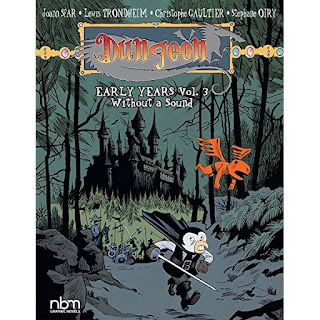Hyacinthe has retreated back to his family castle, out in the hinterlands. Someday that castle will become the Dungeon of the Zenith and Twilight books; someday Hyacinthe will be known only as the Keeper. We're not quite there yet, but we're getting close. If there are no more Early Years books after these two, we would be satisfied, I think.
Without a Sound collects the two most recent of the Dungeon: Early Years books, the sub-series that focuses on Hyacinthe and the creation of the Dungeon. This translation is by Joe Johnson, from 2022, and includes the original French bande dessinees Sans un bruit (from 2008, before the big Dungeon hiatus) and Survivre aujourd'hui (March of 2022).
(See my posts on the first two Early Years books, The Night Shirt and Innocence Lost, and, generally, my entire "Dungeon Fortnight" series of posts about the larger group of series.)
The first book, Without a Sound itself, tells two simultaneous stories. Hyacinthe's father Arakoo, the aged lord of this castle, who filled his son's head with stories of chivalry and other useless things, is riding out to find and catch up with his old comrades. It's not a completely Quixotic quest, since he's still strong and smart and skilled, but it's badly timed and Arakoo is yet another one of those people in Dungeon who always see the world as they want it to be rather than how it is. Alexandra, the ex-assassin, rides with him, and will protect him as much as she can, from others and from himself.
The other thread follows Professor Cormor and a troll whose bridge (into Antipolis) has been destroyed. Cormor has a plan to rebuild Antipolis, and is visiting the remaining nobles - presumably in their respective rural estates - to drum up their support. He takes the despondent troll with him spontaneously, the reader guesses partially as a bodyguard and partially to cheer him up.
The two plots intersect, as they must. In Terra Amata, all plots intersect, and conflict. So one of the old comrades Arakoo wants to meet is no longer trustworthy, and the nobles Cormor assembles lead an army to "find" the money to rebuild Antipolis - and it all crashes together, as it must, in blood and death and destruction.
Without a Sound, the bande dessinee, is not mostly about Hyacinthe; he doesn't do much until the end. But it has an effect on him, and transforms his world.
The second bande dessinee is translated with the title Surviving Today. The Dungeon has already begun to attract attackers, mostly small groups. Many of them want to kill Hyacinthe specifically; a worryingly large number of them are reaching him. The staff is still small and mostly not warlike, the monsters all caged and chained, the traps numerous but not perfect. And armies are roaming the countryside - perhaps started by the nobles in the previous book, we think, perhaps, a general period of war has begun - which may very soon come to threaten the Dungeon.
And Hyacinthe doesn't want to spend his life managing a Dungeon. He's still thinking he can get it all organized, put the place on a good footing, and get away - to be the Night Shirt again, or something else, to live his own life.
But the lesson of Dungeon is always: you don't get what you want. You might get a quick, unexpected death. You might get horrors. You might get opportunities for crime and riches beyond your wildest imagination. You might get treachery and pain. Whatever you get, you probably won't want it. But you get it anyway.
Hyacinthe gets to be the Keeper of the Dungeon. By the end of this book, he knows that. I won't say he likes it, but he's resigned to it. And that may be as good as it gets, in the Dungeon.
Along the way, Marvin joins him, and Grogro. And the Dungeon both repels an invading army and organizes a union - it's turning, step by step, into the place we see in Zenith.
As always, all the Dungeon stories are written by Joann Sfar and Lewis Trondheim, probably bashed out together in a corner, in snatched moments during a family vacation somewhere. Unlike the earlier Early Years books, which were all drawn by Christophe Blain, these two stories are from different hands: Christophe Gaultier for Sound and Stephane Oiry for Today. Gaultier has a rougher style, all little lines and darkness, while Oiry is cleaner and more open - both work well for their stories, both integrate well into the larger Dungeon world, which has had a lot of hands on the art.
And, once again, I see I've written about Dungeon without talking about the humor. It's dark humor, especially in the Early Years books, but it's there, on nearly every page - the jokes of people in danger, the funny situations of the deluded and confused. But it is funny, and that cuts the darkness. The world of Terra Amata may be cruel and dangerous and full of horrible people, but at least you can laugh at it.
It's not unlike other worlds we know, that way.

No comments:
Post a Comment